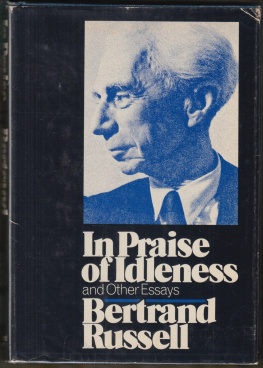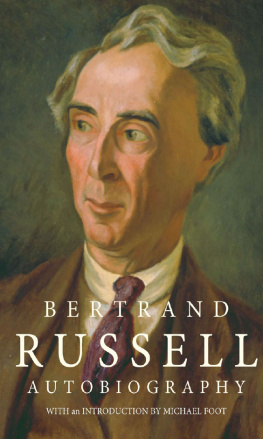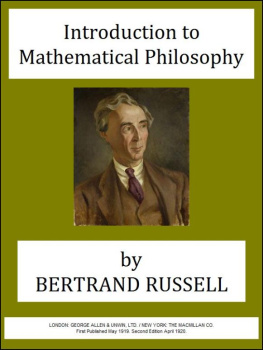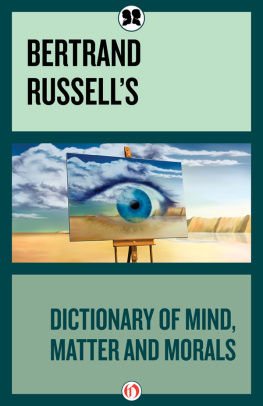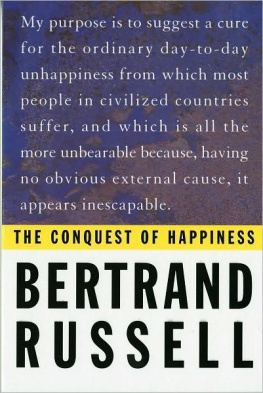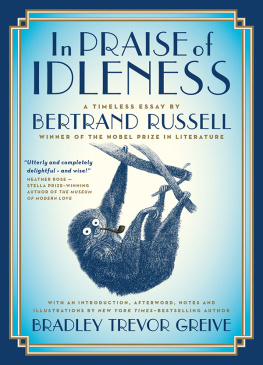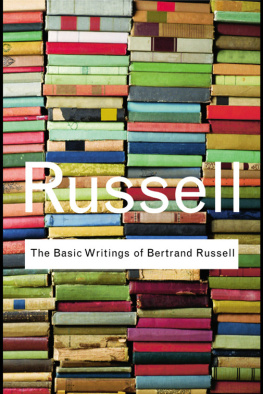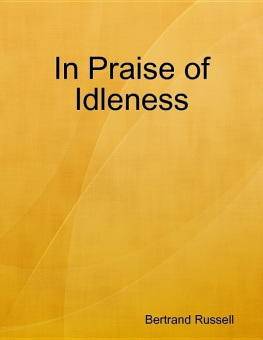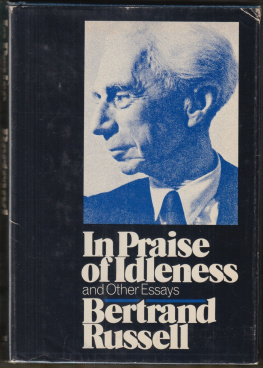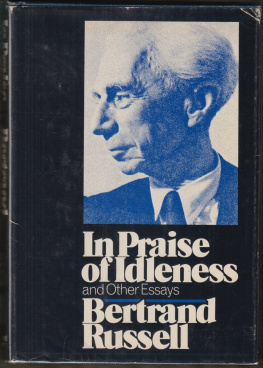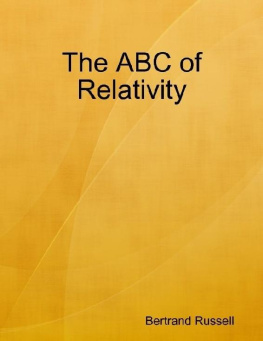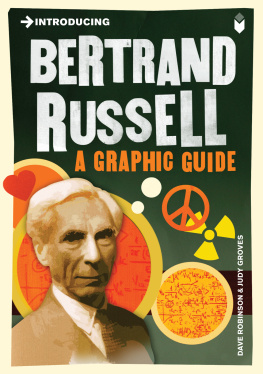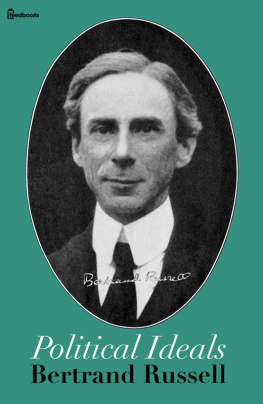Bertrand Russell - In Praise Of Idleness and Other Essays
Here you can read online Bertrand Russell - In Praise Of Idleness and Other Essays full text of the book (entire story) in english for free. Download pdf and epub, get meaning, cover and reviews about this ebook. year: 1935, publisher: George Allen & Unwin, genre: Science. Description of the work, (preface) as well as reviews are available. Best literature library LitArk.com created for fans of good reading and offers a wide selection of genres:
Romance novel
Science fiction
Adventure
Detective
Science
History
Home and family
Prose
Art
Politics
Computer
Non-fiction
Religion
Business
Children
Humor
Choose a favorite category and find really read worthwhile books. Enjoy immersion in the world of imagination, feel the emotions of the characters or learn something new for yourself, make an fascinating discovery.
- Book:In Praise Of Idleness and Other Essays
- Author:
- Publisher:George Allen & Unwin
- Genre:
- Year:1935
- Rating:3 / 5
- Favourites:Add to favourites
- Your mark:
- 60
- 1
- 2
- 3
- 4
- 5
In Praise Of Idleness and Other Essays: summary, description and annotation
We offer to read an annotation, description, summary or preface (depends on what the author of the book "In Praise Of Idleness and Other Essays" wrote himself). If you haven't found the necessary information about the book — write in the comments, we will try to find it.
In Praise Of Idleness and Other Essays — read online for free the complete book (whole text) full work
Below is the text of the book, divided by pages. System saving the place of the last page read, allows you to conveniently read the book "In Praise Of Idleness and Other Essays" online for free, without having to search again every time where you left off. Put a bookmark, and you can go to the page where you finished reading at any time.
Font size:
Interval:
Bookmark:
By the same Author
THE ANALYSIS OF MIND
Fourth Impression
OUR KNOWLEDGE OF THE EXTERNAL WORLD
Second Edition AN OUTLINE OF PHILOSOPHY
Second Impression MYSTICISM AND LOGIC
Seventh Impression THE CONQUEST OF HAPPINESS
Fifth Impression SCEPTICAL ESSAYS
Third Impression THE SCIENTIFIC OUTLOOK
PRINCIPLES OF SOCIAL RECONSTRUCTION
Tenth Impression ROADS TO FREEDOM
Eighth Impression JUSTICE IN WAR-TIME
FREE THOUGHT AND OFFICIAL PROPAGANDA FREEDOM AND ORGANIZATION 1814-1914
Second Impression THE PROBLEM OF CHINA ON EDUCATION
Sixth Impression EDUCATION AND THE SOCIAL ORDER
MARRIAGE AND MORALS
Fifth Impression With Dora Russell THE PROSPECTS OF INDUSTRIAL CIVILIZATION
Third Impression With Scott Nearing BOLSHEVISM AND THE WEST
BERTRAND RUSSELL
IN PRAISE OF IDLENESS
AND OTHER ESSAYS

LONDON
GEORGE ALLEN & UNWIN LTD
MUSEUM STREET
FIRST PUBLISHED IN 1935
All rights reserved PRINTED IN GREAT BRITAIN BY UNWIN BROTHERS LTD., WOKING
IN PRAISE OF IDLENESS
Like most of my generation, I was brought up on the saying : Satan finds some mischief still for idle hands to do. Being a highly virtuous child, I believed all that I was told, and acquired a conscience which has kept me working hard down to the present moment. But although my conscience has controlled my actions , my opinions have undergone a revolution. I think that there is far too much work done in the world, that immense harm is caused by the belief that work is virtuous, and that what needs to be preached in modern industrial countries is quite different from what always has been preached. Everyone knows the story of the traveller in Naples who saw twelve beggars lying in the sun (it was before the days of Mussolini), and offered a lira to the laziest of them. Eleven of them jumped up to claim it, so he gave it to the twelfth. This traveller was on the right lines. But in countries which do not enjoy Mediterranean sunshine idleness is more difficult, and a great public propaganda will be required to inaugurate it. I hope that, after
reading the following pages, the leaders of the Y.M.C.A. will start a campaign to induce good young men to do nothing. If so, I shall not have lived in vain.
Before advancing my own arguments for laziness, I must dispose of one which I cannot accept. Whenever a person who already has enough to live on proposes to engage in some everyday kind of job, such as school-teaching or typing, he or she is told that such conduct takes the bread out of other peoples mouths, and is therefore wicked. If this argument were valid, it would only be necessary for us all to be idle in order that we should all have our mouths full of bread. What people who say such things forget is that what a man earns he usually spends, and in spending he gives employment. As long as a man spends his income, he puts just as much bread into peoples mouths in spending as he takes out of other peoples mouths in earning. The real villain, from this point of view, is the man who saves. If he merely puts his savings in a stocking, like the proverbial French peasant, it is obvious that they do not give employment. If he invests his savings, the matter is less obvious, and different cases arise.
One of the commonest things to do with savings is to lend them to some Government. In view of the fact that the bulk of the public expenditure of most civilized Governments consists in payment for past
wars or preparation for future wars, the man who lends his money to a Government is in the same position as the bad men in Shakespeare who hire murderers. The net result of the mans economical habits is to increase the armed forces of the State to which he lends his savings. Obviously it would be better if he spent the money, even if he spent it in drink or gambling.
But, I shall be told, the case is quite different when savings are invested in industrial enterprises. When such enterprises succeed, and produce something useful, this may be conceded. In these days, however, no one will deny that most enterprises fail. That means that a large amount of human labour, which might have been devoted to producing something that could be enjoyed, was expended on producing machines which, when produced, lay idle and did no good to anyone. The man who invests his savings in a concern that goes bankrupt is therefore injuring others as well as himself. If he spent his money, say, in giving parties for his friends, they (we may hope) would get pleasure, and so would all those upon whom he spent money, such as the butcher, the baker, and the bootlegger. But if he spends it (let us say) upon laying down rails for surface cars in some place where surface cars turn out to be not wanted, he has diverted a mass of labour into channels where it gives pleasure to no one. Nevertheless, when he becomes poor
through the failure of his investment he will be regarded as a victim of undeserved misfortune, whereas the gay spendthrift, who has spent his money philanthropically, will be despised as a fool and a frivolous person.
All this is only preliminary. I want to say, in all seriousness, that a great deal of harm is being done in the modern world by belief in the virtuousness of work, and that the road to happiness and prosperity lies in an organized diminution of work.
First of all : what is work? Work is of two kinds : first, altering the position of matter at or near the earths surface relatively to other such matter; second, telling other people to do so. The first kind is unpleasant and ill paid; the second is pleasant and highly paid. The second kind is capable of indefinite extension: there are not only those who give orders, but those who give advice as to what orders should be given. Usually two opposite kinds of advice are given simultaneously by two organized bodies of men; this is called politics. The skill required for this kind of work is not knowledge of the subjects as to which advice is given, but knowledge of the art of persuasive speaking and writing, i.e. of advertising.
Throughout Europe, though not in America, there is a third class of men, more respected than either of the classes of workers. There are men who, through ownership of land, are able to make others
pay for the privilege of being allowed to exist and to work. These landowners are idle, and I might therefore be expected to praise them. Unfortunately, their idleness is only rendered possible by the industry of others ; indeed their desire for comfortable idleness is historically the source of the whole gospel of work. The last thing they have ever wished is that others should follow their example.
From the beginning of civilization until the Industrial Revolution, a man could, as a rule, produce by hard work little more than was required for the subsistence of himself and his family, although his wife worked at least as hard as he did, and his children added their labour as soon as they were old enough to do so. The small surplus above bare necessaries was not left to those who produced it, but was appropriated by warriors and priests. In times of famine there was no surplus ; the warriors and priests, however, still secured as much as at other times, with the result that many of the workers died of hunger. This system persisted in Russia until I1 1 an d still persists in the East; in England, in spite of the Industrial Revolution, it remained in full force throughout the Napoleonic wars, and until a hundred years ago, when the new class of manufacturers acquired power. In America, the system came to an end with the Revolution, except in the
Next pageFont size:
Interval:
Bookmark:
Similar books «In Praise Of Idleness and Other Essays»
Look at similar books to In Praise Of Idleness and Other Essays. We have selected literature similar in name and meaning in the hope of providing readers with more options to find new, interesting, not yet read works.
Discussion, reviews of the book In Praise Of Idleness and Other Essays and just readers' own opinions. Leave your comments, write what you think about the work, its meaning or the main characters. Specify what exactly you liked and what you didn't like, and why you think so.

